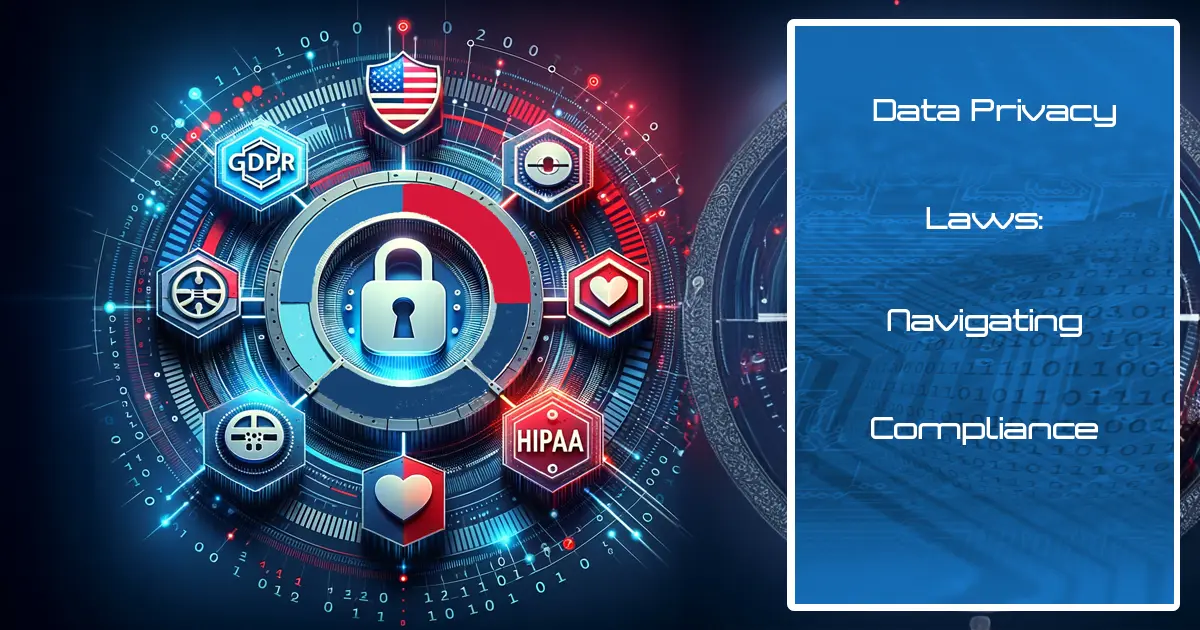Data Privacy Laws Compliance: In our data-driven world, compliance with data privacy laws like GDPR and HIPAA is not only a legal necessity but a key factor in building customer trust and maintaining business integrity. This guide offers an in-depth look into these crucial regulations, helping businesses understand and navigate the complexities of data privacy laws.
Understanding Data Privacy Laws Compliance
General Data Protection Regulation (GDPR):
- Scope: Applicable to any entity processing personal data of EU residents, regardless of the company’s location.
- Key Provisions: Includes consent for data processing, rights to access and erasure (the right to be forgotten), and data portability.
Health Insurance Portability and Accountability Act (HIPAA):
- Scope: Relevant to U.S. healthcare providers, health plans, and healthcare clearinghouses.
- Key Provisions: Focuses on protecting sensitive patient health information, ensuring data confidentiality and security.
Data Privacy Laws Compliance: Other Notable Data Privacy Laws
- Canada’s PIPEDA: Regulates the collection, use, and disclosure of personal data by private sector organizations.
- UK’s Data Protection Act: Oversees the use of personal information by organizations, businesses, or the government.
The Impact of Data Privacy Laws Compliance on Businesses
Ignoring data privacy laws can lead to significant penalties, legal challenges, and reputational harm. For example, GDPR violations can incur fines up to 4% of annual global turnover or €20 million. The reputational damage from non-compliance can erode customer trust and business prospects.
How-To Guide: Steps for Achieving Compliance with Data Privacy Laws
Step 1: Understand the Specific Laws Applicable to Your Business
- Research Regulations: Identify which laws like GDPR, HIPAA, PIPEDA, or the UK’s Data Protection Act are relevant to your business operations.
- Key Provisions: Understand the key provisions of these laws, such as consent for data processing, rights to access, and data security requirements.
Step 2: Conduct a Data Audit
- Identify Data Collection Points: Determine where and how your business collects personal data.
- Data Mapping: Map out the flow of data within your organization to understand where and how data is stored, used, and transferred.
Step 3: Implement Necessary Changes
- Update Policies and Procedures: Modify your data handling practices to comply with legal requirements.
- Consent Management: Ensure that your methods for obtaining consent are compliant, particularly under regulations like GDPR.
Step 4: Enhance Data Security Measures
- Invest in Security Technologies: Use tools like encryption and anonymization to protect data.
- Regular Security Audits: Conduct regular audits to ensure continuous protection and compliance.
Step 5: Train Your Staff
- Educational Programs: Implement training programs to educate your employees about data privacy laws and your company’s policies.
- Promote Compliance Culture: Encourage a culture of compliance and data protection within your organization.
Step 6: Plan for Ongoing Compliance
- Compliance Software: Consider using compliance management software for continuous regulation updates and adherence.
- Regular Reviews: Regularly review your compliance status and adapt to any changes in data privacy laws.
Achieving Data Privacy Laws Compliance is a dynamic and ongoing process. By taking these proactive steps, your business can not only comply with legal standards but also reinforce customer trust in your data protection practices.
For further guidance and tailored solutions for data privacy law compliance, connect with Grab The Axe. Visit grabtheaxe.com or call us at (602) 828-0532 to secure your business’s data privacy.
The Role of Technology in Data Privacy Laws Compliance
Utilizing technology is crucial for compliance. Data encryption safeguards information in transit and at rest, while anonymization techniques minimize compliance risks by stripping identifiable data. Compliance management software automates compliance tasks, offering regular updates on regulations and ensuring ongoing adherence.
Conclusion
Mastering data privacy laws is a complex but essential task for modern businesses. Understanding these laws, implementing effective strategies, and embracing technology enable businesses to not only comply but also demonstrate their dedication to data protection.
For expert guidance in achieving and maintaining compliance with data privacy laws, turn to Grab The Axe. Our team provides in-depth consultations and bespoke solutions for your specific needs. Visit grabtheaxe.com or call us at (602) 828-0532 to protect your data and secure regulatory compliance.
References:
CodeIT. (n.d.). The Pocket Guide On Data Compliance For HIPAA, GDPR, PIPEDA, CCPA. Retrieved from https://codeit.us
Immuta. (2023, August 24). A Guide to Data Security Compliance Laws and Regulations. Retrieved from https://www.immuta.com
To Learn More:
Data Privacy Solutions: Unlock the Power of Data Privacy for Your Organization
Personal Data Privacy Strategies: Guarding Your Digital Self





Pingback: Exploring the NIST CSF 2.0 Update: 5 Critical Changes Every Cybersecurity Professional Must Know - Grab The Axe
Pingback: Data Privacy Solutions: Unlock the Power of Data Privacy for Your Organization - Grab The Axe
Pingback: Guarding the Gates: Essential Cybersecurity Threats for Businesses to Overcome - Grab The Axe
Pingback: The Importance of Healthcare Cybersecurity in Phoenix: Protecting Patient Data in a Digital Age - Grab The Axe